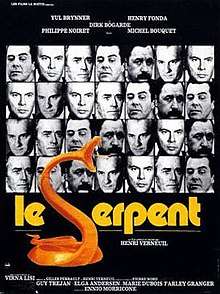Night Flight from Moscow
Night Flight from Moscow (also known as The Serpent)[1][2] (French: Le Serpent) is a 1973 French-Italian-West German Cold War spy-thriller film that was produced, cowritten and directed by Henri Verneuil and starred Yul Brynner, Henry Fonda, Dirk Bogarde and Philippe Noiret. The score was composed by Ennio Morricone.
| Night Flight from Moscow | |
|---|---|
 Film poster under title Le Serpent | |
| Directed by | Henri Verneuil |
| Produced by | Henri Verneuil |
| Screenplay by | Henri Verneuil Gilles Perrault |
| Based on | Le 13e suicidé by Pierre Nord |
| Starring | Yul Brynner Henry Fonda Dirk Bogarde |
| Music by | Ennio Morricone |
| Cinematography | Claude Renoir |
| Edited by | Pierre Gillette |
Production company | Les Films de la Boétie Euro International Film Rialto Film |
| Distributed by | Pathfinder Pictures AVCO Embassy Pictures |
Release date | 7 April 1973 |
Running time | 113 minutes |
| Country | France Italy West Germany |
| Language | English French German |
Plot
Aleksey Teodorovic Vlassov (Yul Brynner), a high-ranking KGB official who defects while he is in France, has highly classified information as part of a deal with Western intelligence for his arrival in the United States. The debriefing is held at Langley by DCI Allan Davies (Henry Fonda) and MI6 representative Philip Boyle (Dirk Bogarde). Vlassov hands a list that he has of enemy agents in Western Europe, including a deep penetration into NATO.
Davies wants to begin operations to arrest the agents, but those on the list suddenly begin to die off. The CIA also has suspicions over the authenticity of Vlassov's claims. The CIA discovers that a defection photo of Vlassov had been taken in the Soviet Union, not in Turkey, because of the contours of Mount Ararat in the background. Vlassov also fails a lie detector test after he angrily protests sexually related questions that are asked by the CIA during the test.
Cast
- Yul Brynner as Aleksey Teodorovic Vlassov
- Henry Fonda as Allan Davies
- Dirk Bogarde as Philip Boyle
- Philippe Noiret as Lucien Berthon
- Michel Bouquet as Tavel
- Martin Held as Lepke
- Virna Lisi as Annabel Lee
- Paola Pitagora as Jeannine Santelli
- Elga Andersen as Kate Cross
- Marie Dubois as Suzanne
- Nathalie Nerval as Tatiana Vlassov
- Farley Granger as Computer Programming Director
- Luigi Diberti as Lefevre
- Robert Alda as Man interrogated by Tavel
Reception
The film received mixed reviews. A contemporary review by Tony Mastroianni in the Cleveland Press stated that the film demonstrated how in 1973, the computer had replaced the dagger in espionage. The reviewer also concluded the film had "more good moments than bad".[3] Time Out called it "a very traditional spy fable" and "the only thing that sets this film apart is the totally consistent layer of impenetrable gloss with which Verneuil covers it, and his general directorial tricksiness, which runs the gamut from the irrelevant to the pretentious and back">[1] TV Guide described it as "a solid international espionage tale" and added that "this is a gritty, tightly directed look at international intrigue, and the performances are all finely tuned. Particularly effective is Bogarde who offers a insightful portrait of a cool, calculating agent".[2]
References
- "The Serpent". Time Out London. Retrieved 2019-10-05.
- "The Serpent | TV Guide". TVGuide.com. Retrieved 2019-10-05.
- Mastroianni, Tony (1973-11-23). "Review: CIA spy film: It's not Dullesville". Cleveland State University Library. Retrieved 2013-06-25.